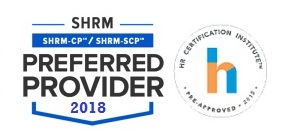Identifying Malingerers and Mitigating Damages in Workers’ Compensation under ADA Title 1
Tuesday, June 19th, 9:00 a.m. to 12:15 p.m.
Hosted by Industrial Rehabilitation & Evaluation Services, LLC
770 West Hampden Avenue, Suite 300
Denver, Colorado
Contact Hours: 3.0
Tuition: $195; Early Bird Tuition Expires Monday, June 4th: $145
This course was initially designed for legal counsel and physicians who practice in Colorado’s workers’ compensation system. The issues discussed in the class apply to all forms of employment testing (post-offer, stay-at-work functional capacity evaluation, physician work physicals, and short-term disability.)
In response to inquiries from the work evaluation practitioners, this course is now open to all those interested in the risks and opportunities triggered by the gap between employment-related medical examination practices and the practice guidelines emanating from federal court settlements.
To support your learning, we use a combination of recent federal settlements and case scenarios. We intend that these real-life situations and rulings will serve as a reference as you apply the knowledge gained in the course to your daily work.
Legal counsel, when deciding to pursue (or defend) a charge of discrimination under the medical examination section of ADA Title 1 (42 U.S. Code § 12112 (d)) navigates a world of new clinical jargon and often unfamiliar work evaluation practices. This workshop ties clinical jargon and evaluation practices to matching legal principles in the law.
Occupational health and primary care physicians, whose practice includes workers’ compensation, hiring, or general disability employment decisions are at risk under ADA Title 1. Long-held practices, including a focus on identifying malingerers, distract some physicians from more immediate ADA Title I legal issues. We guarantee that this 1/2 day of training will result in important changes to the way physicians think about occupational medicine and workers’ compensation practices.
Occupational therapists and physical therapists are the main providers of the medical examination services under ADA Title I. As a result of this training, therapists will make important adjustments to how they practice functional capacity evaluation, post-offer, pre-employment testing, and work hardening or work conditioning. As with physicians, therapists are the subject of many large-dollar federal settlements.
Gucker v U.S. Steel
This intense 3-hour session features a practical analysis of two ADA Title 1 medical examinations. The first case, Gucker v U.S. Steel begins on the day a long-time employee returns to work after unremarkable gallbladder surgery. A new regional manager’s belief about medical restrictions triggers a federal court lawsuit. The local FCE service provider, a medical doctor and a doctor of physical therapy compound the company’s legal exposure by performing a non-compliant functional capacity evaluation. This ADA Title I actions result in an initial $5.5 million settlement. Colorado practitioners will recognize similarities between Gucker and regional medical examination practices.
Iso-Kinetic Evaluation Equipment, Catching Malingerers, Reasonable Accommodation
Our second example looks at the use of an iso-kinetic testing apparatus to perform a stay-at-work functional capacity evaluation under ADA Title I. This evaluation is a cautionary tale about trading technology for the skills of well-trained human work evaluator.
- The practice of focusing on identifying “malingerers.”
- The failure of workability examinations performed without knowledge of the demands of the job.
- The failure of worker evaluators and physicians to include reasonable accommodation when answering the ability to work question.
- The reliance on high-tech equipment to make human decisions.
Fortunately, this potential charge of employment discrimination never saw the litigated light of day as the employer wisely withdrew the functional capacity evaluation after a brief review by an expert in ADA Title I medical examination.
Areas of Risk and Exposure
The fast-moving nature of this course will not get in the way of discussing important issues. Participants in the training are encouraged to select from this list of topics for review as time allows:
- A work product which states the individual cannot perform the physical demands of the essential functions because of inconsistent effort.
- A work product which uses physical demands defined in term of Occasional, Frequently, or Constant
- Defense to a charge of employment discrimination
- Employment agency exposure
- Endurance requirement not connected to disability and physical demand
- Physical or cognitive job demands not linked to an essential function
- Essential function versus physical or cognitive work demand
- Essential functions incorrectly defined as including lifting, carrying, pushing, pulling
- Functional capacity evaluation systems which attempt to “catch” inconsistent effort
- Job description indicating a lifting requirement higher than NIOSH limits
- Medical examinations and inquiries as defined in ADA Title 1
- Interchanging important terms such as impairment and disability
- ADA Title 1 workability decision without reference to a job description
- Post-Offer, Pre-Placement Testing (PPT or POET)
- Qualification standards as the foundation for the workability decision
- Qualified individual as the key phrase in ADA Title 1
- Reliance on a large patient outcome database rather than the demands of the specific job
- Return-to-work medical examination (functional capacity evaluation) – STD
- Return-to-work medical examination (functional capacity evaluation) – Workers’ Compensation
- Stay-at-work medical examination (functional capacity evaluation) – ADA Title 1
- The cost of ignoring an in-place reasonable accommodation
- The physician’s workability decision affected by the presence of signs of low effort
- The physician’s workability decision that does not address reasonable accommodation
- The work product that discusses low effort but does not discuss potential causes
- Impairment versus work disability as the barrier to the “qualified individual” status

Roy Matheson, ADAC has a 30-year background in occupational rehabilitation and ergonomic evaluation training and professional certification. His initial exposure to employment testing began at the Employment and Rehabilitation Institute of California (ERIC) in 1983. The rehabilitation and work evaluation philosophies at the heart of the medical examination section of ADA Title I originated at ERIC under its founder, Dr. Leonard Matheson.
Work tolerance screening, work capacity evaluation (now known as ‘functional capacity evaluation’), and work hardening were introduced as new rehabilitation services at ERIC clinic. Roy Matheson’s contribution to the growth of employment testing under the Matheson philosophy was the development of training programs, software, and equipment used by therapists around the globe.
In 2012, the effect of federal court cases involving employment testing served as a call to action for Roy Matheson. In the ensuing years, he transitioned to what is now Reasonable Accommodation, LLC, and reasonable accommodation.com. His practice focuses on advising and training employers, government agencies, therapists, and legal counsel of the mechanics of medical examination and reasonable accommodation under ADA Title I.
Roy has presented as a keynote speaker, panelist, trainer, or workshop instructor at more than 400 public and private educational events, management training programs, and national conferences. His audience includes managers and staff of federal, state, county, and municipal government entities as well as the full spectrum of corporate entities across the United States, Canada, and six other countries. Roy’s body of work includes hundreds of online webinars and blogs related to Title I of the ADA and the Rehabilitation Act.
His consulting and guidance assignments address legal compliance issues raised under Title I of the Americans with Disabilities Act and Section 501 of the Rehabilitation Act. These issues include aspects of employment testing, essential function job analysis, and reasonable accommodation program start-up and management. Roy sees himself as a trusted adviser in demanding situations requiring clear, well-thought-out guidance within the environment of employment and disability-related civil rights law.





